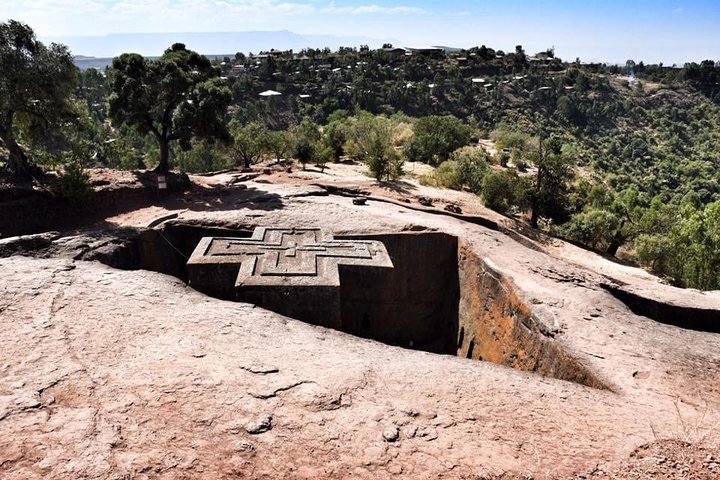
Lalibela, located in the heart of the Amhara region of Ethiopia, is a destination that promises a journey back in time, offering a unique blend of history, spirituality, and breathtaking landscapes. This ancient town is renowned for its monolithic rock-hewn churches, which are considered one of the greatest architectural achievements of humankind. These churches, carved out of solid rock in the 12th century, are not only a testament to the incredible craftsmanship of the time but also a living, breathing center of Ethiopian Orthodox Christianity.
One of the must-do activities in Lalibela is the Ancient Architecture Tour, where you can delve deep into the history and traditions that have shaped this remarkable place. The tour offers an immersive experience, allowing you to explore the intricacies of the rock-hewn churches and understand their significance in Ethiopian culture.
For those looking to combine adventure with spirituality, the Danakil Depression Tour is an excellent choice. This tour not only takes you through the ancient churches of Lalibela but also ventures into the Danakil Depression, one of the hottest and most inhospitable places on Earth, offering a stark contrast to the serene and spiritual atmosphere of Lalibela.
If you prefer a more relaxed pace, the Asheton Mariam Monastery Trip provides a perfect blend of scenic beauty and cultural immersion. This day trip takes you to the Asheton Mariam Monastery, perched high in the mountains, offering stunning views of the surrounding landscape and a glimpse into the monastic life of the region.
For a comprehensive exploration of Lalibela’s architectural wonders, the Rock Churches Guided Tour is highly recommended. This tour offers a detailed look at the UNESCO World Heritage Site, with knowledgeable guides who bring the history and significance of these ancient structures to life.
Finally, for those who want to experience the local culture and hospitality, the Roha Walking Tour is a fantastic option. This walking tour provides an intimate look at the daily life in Lalibela, with passionate guides who share their love for their hometown and its rich heritage.
Lalibela is not just a destination; it’s a journey into the past, a spiritual retreat, and an adventure all rolled into one. Whether you’re a history buff, a spiritual seeker, or an adventure enthusiast, Lalibela has something to offer for everyone.
Lalibela, located in the heart of the Amhara region of Ethiopia, is a destination that promises a journey back in time, offering a unique blend of history, spirituality, and breathtaking landscapes. This ancient town is renowned for its monolithic rock-hewn churches, which are considered one of the greatest architectural achievements of humankind. These churches, carved out of solid rock in the 12th century, are not only a testament to the incredible craftsmanship of the time but also a living, breathing center of Ethiopian Orthodox Christianity.
One of the must-do activities in Lalibela is the Ancient Architecture Tour, where you can delve deep into the history and traditions that have shaped this remarkable place. The tour offers an immersive experience, allowing you to explore the intricacies of the rock-hewn churches and understand their significance in Ethiopian culture.
For those looking to combine adventure with spirituality, the Danakil Depression Tour is an excellent choice. This tour not only takes you through the ancient churches of Lalibela but also ventures into the Danakil Depression, one of the hottest and most inhospitable places on Earth, offering a stark contrast to the serene and spiritual atmosphere of Lalibela.
If you prefer a more relaxed pace, the Asheton Mariam Monastery Trip provides a perfect blend of scenic beauty and cultural immersion. This day trip takes you to the Asheton Mariam Monastery, perched high in the mountains, offering stunning views of the surrounding landscape and a glimpse into the monastic life of the region.
For a comprehensive exploration of Lalibela’s architectural wonders, the Rock Churches Guided Tour is highly recommended. This tour offers a detailed look at the UNESCO World Heritage Site, with knowledgeable guides who bring the history and significance of these ancient structures to life.
Finally, for those who want to experience the local culture and hospitality, the Roha Walking Tour is a fantastic option. This walking tour provides an intimate look at the daily life in Lalibela, with passionate guides who share their love for their hometown and its rich heritage.
Lalibela is not just a destination; it’s a journey into the past, a spiritual retreat, and an adventure all rolled into one. Whether you’re a history buff, a spiritual seeker, or an adventure enthusiast, Lalibela has something to offer for everyone.




















